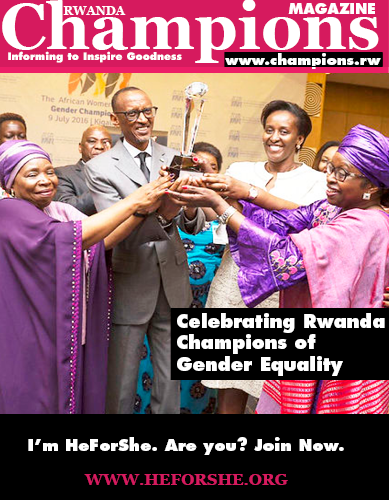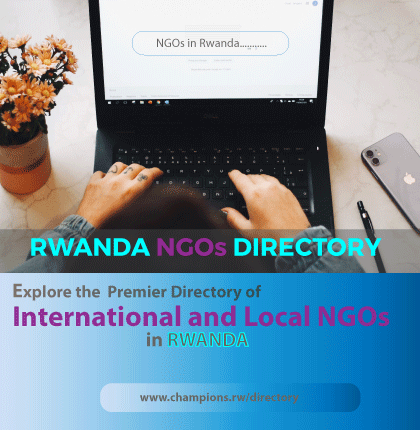328 Children Live With Incarcerated Mothers, 44 Yet to Be Placed
Rwanda’s Ministry of Gender and Family Promotion said 328 children are currently living with their incarcerated (…)

By François BISENGIMANA
Introduction
Historically, the Rwandan society has been underpinned by a culture of solidarity, where reciprocity and social engagement are the driving forces of communities. Initiatives such as Ubudehe, Umuganda or Umusanzu focus on bringing communities and families together to provide services to their communities. Within the health sector, a volunteer group of Community Health Workers (abajyanama b’ubuzima) has been successfully providing health services down to village level. In the justice sector, Gacaca courts and Abunzi are contributing to a decentralized provision of legal services.
Local government officials and community members alike are volunteering their time and efforts to contribute to the development of their communities.
In relation to child protection, enshrined in the Rwandan society is the belief that children not only belong to the biological parents, but also to the extended family and community at large, promoting the positive value of "treating every child as your own”.
Within the legal and policy framework, child protection has remained a priority area for the Government of Rwanda since its ratification of the UN Convention on the Rights of the Child (CRC).
François BISENGIMANA
The constitution of Rwanda places further emphasis on the role of the family as the “natural basis of Rwandan society” and children’s rights and programming have been mainstreamed across various thematic areas and ministerial mandates.
To this end, the 2011 Integrated Child Rights Policy outlines a single comprehensive vision across various child-related thematic areas of concern in order to create an environment in which child development, survival, protection and participation are ensured through a well-coordinated and multi-sectoral approach.
To ensure the implementation of the above mentioned vision, laws and policies, the Government is committed to establishing a strong child protection system from grass-roots to national level.
In 2012 the Government of Rwanda put in place the Strategy for National Child Care Reform, which foresees the reintegration of children living into residential child care centers into families and transformation of all orphanages in the country.
The National Commission for Children (NCC) has been charged with the operationalization of the Child Care Reform starting with “Tubarerere Mu Muryango (TMM)” programme as an entry point.
The TMM programme employs social workers and psychologists on district level to reintegrate children in safe and supportive family and community environments.
Furthermore, the TMM programme will serve as a vehicle to build holistic and sustainable child care and protection systems through the development and implementation of legislation, policy and service provision.
In order to maximize protection of all children–boys and girls-from violence, abuse and neglect through continuous family empowerment and appropriate referral, NCC under the Ministry of Gender and Family Promotion (MIGEPROF) together with partners has established 2 Family and Child Protection Volunteers (Inshuti z’Umuryango) in each village of the Country.
Approaches to a sustainable community-based child and family protection model
In order to ensure sustainable, timely and qualitative prevention and response mechanisms at community level to effectively protect children from violence, abuse, neglect and promote protective norms and attitudes within families such as positive parenting, several key elements have to be addressed.
First, coordination of protection service providers at decentralized level is key to improve efficiency and effectiveness of child protection interventions, harmonize service delivery, and ensure quality assurance across different sectors, institutions and organizations. Rather than creating new structures, building on local capacities and structures contributes to a sustainable approach to child protection, which can ensure an optimal use of human, technical and financial resources and prevent duplication of efforts.
In the Rwandan context, a coordinated approach to harmonize interventions of State and non-State actors will be achieved through the development of national Terms of Reference, the adoption and of child dissemination protection minimum standards and Standard Operating Procedures.
The child and family protection framework should sit within an evidence-informed child protection system. Linkages with formal and informal systems are instrumental both in supporting the work of community-based groups as well as in expanding their reach and scope of impact.
A mapping of service providers across different sectors and administrative levels - including health, education, and justice – will inform the development and implementation of Standard Operating Procedures for referrals to multi-sectoral protection services.
Also, pre- and in-service capacity development programmes should aim at increasing knowledge and skills of community-based child and family protection workers to increase the quality of service delivery (including monitoring and reporting) on the ground.
Specific topics include positive parenting and discipline skills, violence detection and prevention, and case management. A quality assessment and revision of national training manuals on child protection issues should result in to commonly agreed standards, tools and learning outcomes of child protections trainings.
To provide a holistic approach to child protection issues, addressing attitudes, behaviors and social norms that are affecting a child’s development and protection in a community is paramount.
An evidence-based behaviour-change communication strategy focusing on advocacy on child rights, behavior change communication and child-parent relationships can tackle the root causes of violence, abuse and neglect faced by children. In the Rwandan context, community-based groups and gatherings such as parent evenings (umugoroba w’ababyeyi) and Umuganda provide forums to mobilize and engage individuals in child rights and protection discussions.
Roles and responsibilities of Inshuti Z’Umuryango
Through the work of Inshuti z’Umuryango, women, children and their families will be supported by active and effective care and protection community-level mechanisms to significantly reduce violence, abuse, abandonment, child trafficking, child labour and other associated child protection risks in their communities.
To achieve this goal, the following roles and responsibilities will be fulfilled by Inshuti z’Umuryango:
Coordination
In addition to the roles and responsibilities described below, the Inshuti z’Umuryango at cell and sector level has an additional responsibility of coordinating Inshuti z’Umuryango in their respective administrative level.
This includes acting as a liaison between and within administrative layers and organising meetings on a regular basis. The volunteer at sector level in specific will maintain regular contact with child protection team at district level to address concerns and seek technical assistance or advice. The Inshuti z’Umuryango with a coordination role will therefore play a key role as focal person in the dissemination of information and the delivery of trainings.
Preventive interventions
Inshuti z’Umuryango will play a key role in understanding and addressing the root causes of violence, abuse, exploitation and neglect of children.
Sensitization of their peers on child protection and more generally child rights issues, as well as positive parenting and discipline. Sensitization will also include providing community members with information on the services available, including child care and protection services.
Sensitization should take various forms, from household sensitization to smaller group and bilateral discussions in different settings. Preventive interventions will be made through active listening and home visits or follow-ups.
Response interventions
Inshuti z’Umuryango will play a key role as caseworkers. A sound case management system will focus on the needs of an individual child and their families through the coordination of child friendly and child centered services as well as support within an interlinked system.
Participation in coordination forum
Inshuti z’Umuryango from the Umudugudu should meet quarterly at cell level to discuss synergies, challenges and lessons learnt, ideally in the presence of village chiefs and cell authorities. The meetings should be organised by the Inshuti z’Umuryango that is operational at cell level. The reports from the meeting from cell levels are submitted to the sector level.
Following the meetings at cell level, at sector level, twice a year the coordinator of Inshuti z’Umuryango at cell levels will meet for the same purposes, under the leadership of the Officer in Charge of Social Affairs at sector level, the Inshuti z’Umuryango at sector level. Reports from the sector are submitted to the District. To improve coordination, the Inshuti z’Umuryango will be represented in various external coordination forums, including Umuganda, Parent Evenings and the Intersectoral Early Childhood Development (ECD) Committee (sector and village level).
Additionally to these gatherings of Friends of a Family, Inshuti z’Umuryango should advocate for discussing child protection issues during Joint Action Development Forum (JADF) meetings and complex protection cases should also be on the agenda of the security meetings at the sector level.
Criteria for identification of Inshuti z’Umuryango
• To have a Rwandan nationality
• To be persons of integrity
• To be altruistic
• To be committed to children and family values
• To be motivated and interested in volunteerism
• To have enough time to identify and refer child protection cases, regularly conduct home visits, engage in community activities, and report on a monthly basis
• To be well-established in the community as trustworthy and involved in their respective village activities
• To be identified and recommended by community leaders and children, and endorsed by the Village Chief and the President of the Children’s Forum
• To be able to write, read and count in Kinyarwanda
• At least have a minimum education level of primary school
• To have a minimum age of 25 years old
• To have not been involved in criminal acts or in any behavior that is detrimental to children’s lives and interests
Process of establishment of Inshuti z’Umuryango
The process was gradually carried out and completed in 30 Districts after Community works (Umuganda).
Capacity building of Inshuti z’Umuryango
In order to equip Inshuti z’Umuryango with dependable skills before they can start working with the families, NCC is cascading pre-service trainings to Inshuti z’Umuryango.
The Author is Director of Adoption, Protection and Promotion of Child Rights (NCC)
Rwanda’s Ministry of Gender and Family Promotion said 328 children are currently living with their incarcerated (…)
Kigali city officials are raising alarms over a surge in child abuse cases, saying most reports of sexual violence (…)
Every October 11, the world marks the International Day of the Girl Child, a moment to reflect on the opportunities (…)
The Imbuto Foundation officially inaugurated the Masaka Model Early Childhood and Family Centre on Thursday, October (…)

